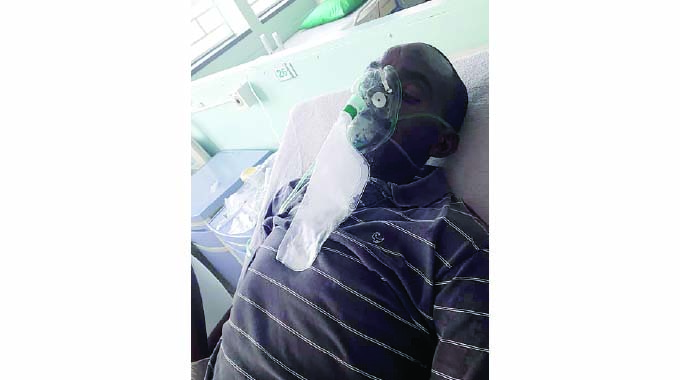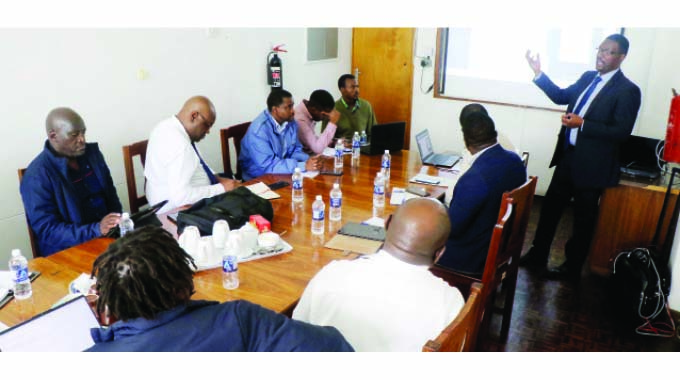Man dies after jumbo attack as woman gored by buffalo battles for life

Leonard Ncube, Victoria Falls Reporter
A MAN from Mabale in Hwange District succumbed to injuries sustained after he was trampled by an elephant while a woman from Mvuthu area outside Victoria Falls is battling for life after she was gored by a stray buffalo.
The two separate incidents occurred last Friday.
Ms Elizabeth Sibanda (64) of Mpumelelo Village 10, Kachechete was left with protruding intestines after being gored by the buffalo, which had strayed into her homestead while fleeing suspected poachers.

Ms Elizabeth Sibanda on a hospital bed after being gored by a Buffalo
The deceased Eliot Siyanyanga (45) of Sonyathi Village in Mabale was walking home from a local business centre when he was attacked by a lone bull elephant resulting in him sustaining four fractured ribs.
He was rushed to St Patrick’s Hospital in Hwange and later transferred to St Luke’s Hospital in Lupane before being taken to Mpilo Central Hospital where he succumbed to the injuries on Sunday.
Siyanyanga was buried yesterday at his village.
Hwange Rural District Council through the Communal Areas Management Programme for Indigenous Resources (Campfire) catered for medical expenses for both victims. The local authority also helped the bereaved family with funeral expenses.
Hwange RDC environment and natural resources officer Mr Nxolelani Ncube said the two incidents are a reflection of simmering human-wildlife conflict.
“On Friday, Eliot Siyanyanga had just dropped off a car and was walking home when he came across an elephant. The jumbo attacked him resulting in sustaining fractured ribs,” he said.
“He was taken to a local hospital and later transferred to Mpilo Central Hospital. The X-ray images showed that he fractured four ribs and he succumbed to the injuries on Sunday.”
Mr Ncube said Ms Sibanda was on her way to the goat pen where she intended to release the animals when she was gored by a buffalo that was being chased by poachers.
“The buffalo attacked the woman and ripped her abdomen. She was rescued by a neighbour who heard her screaming for help and the buffalo retreated,” he said.
Mr Ncube said council rangers managed to put down the two animals.
“This is just a tip of an iceberg and a sign that we are sitting on a time bomb as the population of elephants keeps growing. Yes, the Campfire is trying its best to make sure communities are protected, but the elephant population is a real threat as communities are losing livestock and lives,” he said.
“We wish the issue of compensation for families of victims of human-wildlife conflict could be expedited so that families of these breadwinners are taken care of. We implore Government to give them social welfare status so that they are included in the safety nets being implemented.”
The latest developments come at a time when Government has started mobilising resources to be able to compensate victims of human-wildlife conflict.
Government last year adopted the establishment of a relief fund to cushion victims of human-wildlife conflict by catering for hospital expenses and funeral cover.
The payments will cover three categories: death, maiming, and injuries. A specialised human-wildlife conflict unit will be established under Zimparks.
The fund is based on a self-financing model where proceeds from hunting and crowd funding activities will be mobilised to resource the fund.
These sources include reserving a hunting quota under the CITES granted quota, and a levy on hunting revenue accruing to safari operators, rural district councils and conservancy owners.
Going forward, the fund will be extended to include preventative measures such as providing water in the game parks and enhancing pastures.
The fund will also look at associated impacts such as livestock loss and control of wildlife and livestock movements to curtail the spread of diseases such as foot and mouth. Sources of funding will include Treasury, while local structures will be incorporated into the programme.
Environment, Climate, Tourism and Hospitality Industry Permanent Secretary Mr Raphael Tayerera Faranisi recently said the ministry is working on modalities towards making sure victims are compensated.
Hwange RDC councillor for Kachechete ward, Clr Givemeagain Moyo said the prevalence of human-wildlife cases is worrying.
“It looks like human-wildlife conflict is escalating as wild animals are causing havoc.
What’s needed is for all stakeholders to combine efforts and come up with mitigation measures and ensure co-existence between animals and people,” said Clr Moyo.
Close to 100 people were killed by wild animals countrywide last year. Regionally, Zimbabwe has the highest number of deaths from human-wildlife conflict. In Botswana, there are significantly less deaths, although they have more elephants at almost 130 000.
Controlled hunting of elephants, the major cause of conflict, had kept numbers steady, but the ban has seen elephant populations rising to levels where elephants often move out of wildlife areas into neighbouring villages and farms.
Zimbabwe, Botswana and Namibia, home to more than 60 percent of the world’s elephants, are the largest hit by the hunting ban, which has culminated in an unsustainably large herd of the animals in these countries. – @ncubeleon









Comments